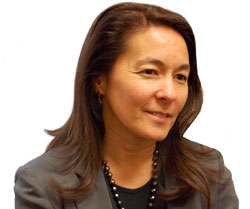Pediatrician Shale Wong Goes to Washington (and Back)
“The only way to learn about federal policy is to be in the middle of it”
By Jenny Deam
 (May 2012) Just days after the 2008 presidential election, Dr. Shale Wong, a Denver pediatrician and community health advocate, submitted her application for the prestigious Robert Wood Johnson Foundation Health Policy fellowship in Washington. “Maybe,” she remembers thinking, “health care reform is finally going to hit the radar.”
(May 2012) Just days after the 2008 presidential election, Dr. Shale Wong, a Denver pediatrician and community health advocate, submitted her application for the prestigious Robert Wood Johnson Foundation Health Policy fellowship in Washington. “Maybe,” she remembers thinking, “health care reform is finally going to hit the radar.”
Wong, an associate professor of pediatrics and co-director of the LEADS (Leadership, Education, Advocacy, Development
Now back in Colorado, Wong, a 1997 CU pediatric resident who received her MSPH from CU in 1999, talks about what she learned inside the Beltway, including how policy gets made and how that experience has shaped her vision for better public health and policy on local and national levels.
Q: Why apply for this program? What did you hope to learn?
A: This fellowship has a tradition of providing an immersion experience in health policy in Washington that is unlike any other fellowship. I was most interested in understanding the process of policy development at the federal level and how a physician could impact that process. As a medical educator, I helped develop a curriculum at CU with an opportunity for students to learn advocacy and leadership in their community.
Q: Does that emphasis represent a shift for medical students?
A: It does. Our program shifts traditional medical training toward one that both supports students’ interest in community service that they bring coming in and gives them direction as future physicians to practice with civic responsibility.
Q: But if you are already doing that here in Colorado why go to Washington?
A: The only way to learn about federal policy is to be in the middle of it. You can’t do the same thing outside of Washington.
Q: Was it intimidating to go to work at the White House? And I have to ask, what is Michelle Obama like?
A: Yes, it is intimidating. It was also an opportunity. To work on such a significant children’s public health issue, and for this First Lady, was like the stars aligning. She has such an amazing presence. She is knowledgeable but is not intimidating at all. One of the surprising things is how she puts people at ease. She is really genuine. She listens to your ideas and is very thoughtful.
Q: Did you swap mom stories?
A: Sure. She’s the “mom-in-chief.” She understood the long hours it took to be part of her staff and she really cared about the well-being of my kids.
Q: How did the partisan battles in Washington affect what you were trying to do?
A: There is no such thing as a non-partisan issue. The politics in Washington right now don’t make sense. But we were able to stay true to our goals and much of the policy work we were doing was at the executive level and didn’t require legislative action. It didn’t bother me personally. There is an expectation in policy development that there will always be opposition.
Q: How has being in the midst of such a volatile time in this country changed your view?
A: Coming home I see things differently. I read the newspaper differently. I know how hard people in Washington are trying to work and I think that gets turned around in the way stories are presented in the media.
Q: What is your proudest accomplishment?
A: I got to work on school nutrition policy, development of the new My Plate icon with the Department of Agriculture, and expanding access to affordable foods through financing initiatives and farmers markets. But I guess what I’m most proud of is the work we did to improve healthy environments in child-care settings. Let’s Move Child Care holds promise to truly target prevention and establish healthy habits from the start.
Q: How do you translate those things on a more local level?
A: All of those policies require local implementation. Going forward, I hope to help other health care providers find their voice in the community. We have a responsibility to share knowledge and exchange information with local leaders and
Q: Is there a gap between physicians and
A: There is a canyon. For the most part, it’s just never been defined as a responsibility of physicians to think policy. Lots of docs don’t want to go there.
Q: Why is it important to get medical students involved in community health?
A: Because doctors need to know where their patients come from. Being involved in the broader community allows us to better understand the environment and the patient’s reality. And it allows us to influence health beyond the clinic. It is a great lesson to learn early on. For
Q: What goals did you come back from Washington with and what are the biggest obstacles to achieving them?
A: I’m hoping to pave a path between Colorado and Washington. With the connections that I made while I was
Q: What
A: (Laughs) I tend to enjoy doing things that my advisors tell me I can’t. I was a dance major. I was told dancers can’t be doctors. Combining medicine and policy is a bit untraditional. What I love about medicine is connecting with people and communicating clearly about their health. What I love about policy is an opportunity to refine the messages around health so they can have an impact with the people who make the rules.